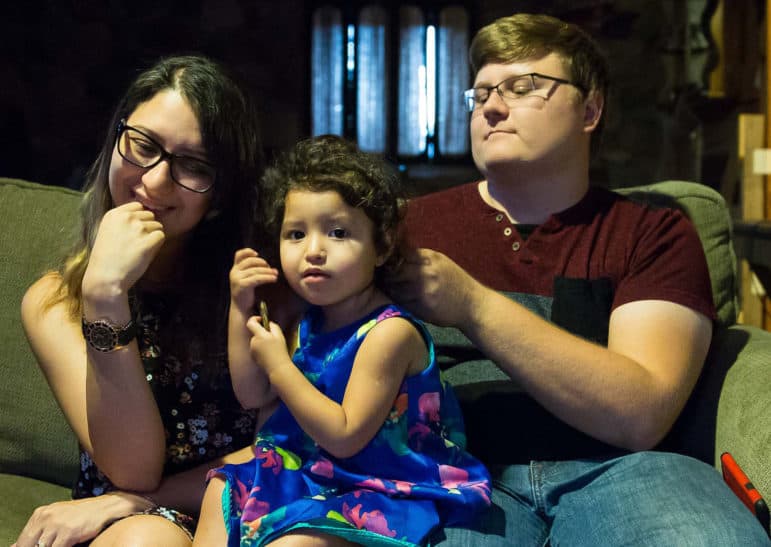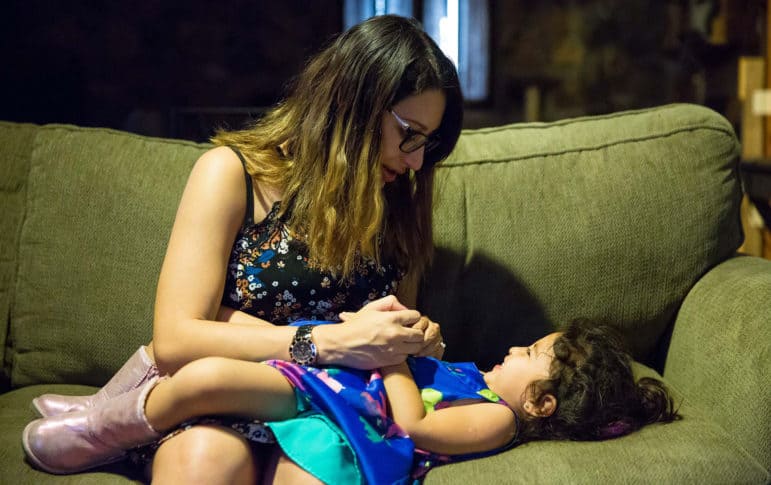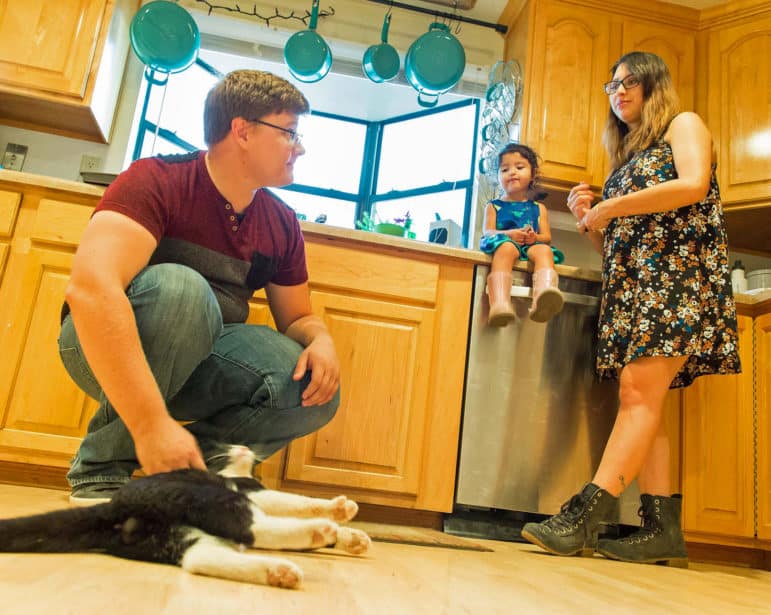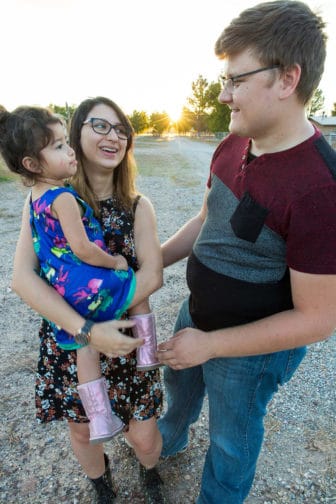LAS CRUCES – Luna Mae is learning about colors. The crayon choices on display in her “My Little Pony” coloring book often don’t match the real world. The pony might be green. The sky might be pink. The grass might be blue. Her world does not reflect the real world. But she’s 2, and that’s OK.
Luna’s parents are much more concerned about colors. Not their own color — Luz Skywalker is brown, Zach Eason is white — but Red and Blue. Luz, 21, and Zach, 20, are about to vote in their first presidential election, and they plan fill in a box for a candidate they don’t think can win. They want to protest the two-party system.
Zach and Luz are millennials, part of the most racially diverse generation yet in the United States. Their generation is frustrated with the nation’s political system, concerned about the future, and ultimately reshaping America.
Their story isn’t black and white. It isn’t Red or Blue. It’s messy, and it reflects the real world.
Back of the bus
Luz and Zach met at the end of their first day of high school in August 2010. It was nearly 100 degrees on the bus, which had no air-conditioning. Zach got on first and headed straight to the last seat, deliberately sitting next to the emergency exit.
Zach had spent the previous four years attending a small, private Christian school where his mother taught and he received reduced tuition. Nearly everyone at that school, like Zach, was white.
So Zach’s first day back in public school brought a sort of culture shock.
Arrowhead Park Early College High School was a brand-new school. In its first year, nearly 72 percent of its 117 students were Hispanic. The school prided itself on the number of students who would become first-generation high school graduates.
When he arrived at school that day, Zach said he thought he “was going to get shot or knifed.” Because of drive-by shootings in his neighborhood, Zach said his father had built the walls of the adobe home two-feet thick. Zach said his father “wasn’t afraid of Mexicans; he was afraid of bullets.”
“But at 14, I probably associated them together,” Zach said.
His father tells a different story. He said the thick walls were for insulation, and he occasionally joked about the house being “bulletproof.”
Regardless, at the end of an uncomfortable first day at Arrowhead Park, Zach was eager to get home. He had only been sitting in the last row a moment when Luz walked up, surrounded by a posse of girls.
“When I first saw Luz, I thought she was going to cut me,” Zach said. “I remember thinking about the park by my house, and how all the little gangbangers had busted up the toilets.”
Luz hadn’t yet started wearing makeup. Her hair was pink, blonde and black. She was wearing a white, diamond-studded tank top, skinny jeans and white high heels.
“And I had my gang, too,” Luz said. “We pretty much owned the back of the bus.”
Luz wouldn’t let Zach move. The ride home, he said, was probably 45 minutes, but it felt like 2-3 hours. As they talked, they discovered they shared a love of cars. Luz thought Zach was funny.
“That’s all it took,” he said. “I had been avoiding all these brown people all day long.”
They quickly became friends. Years later, when they were seniors in high school, Zach and Luz started dating. Today, they’re engaged to be married. They’re a mixed-ethnicity couple in the state that had the highest rate of new marriages between white people and Hispanics – 19 percent – between 2008 and 2010.

Robin Zielinski / NMPolitics.net
Luz Skywalker, 21, Zach Eason, 20, and their daughter Luna, 2, relax in the entertainment room at Zach’s home on Tuesday.
Family changes, name changes
Luz was born Luzaide Arrieta – her maternal grandmother’s maiden surname – to a 15-year-old mother, Melinda. Luz has seven younger siblings. Her stepfather adopted her at age 7, and she became Luz Reza.
That man tried to instill in Luz a belief in Mexican superiority, and not to trust white people, she said. But those beliefs never took hold. Luz grew up with white friends, she said.
Her mother divorced that man in 2007, when Luz was 12.
Luz’s great-grandfather came to the United States through the Bracero program, established in 1942 under the Mexican Farm Labor Agreement with Mexico. He earned a living picking cotton, started a family, and built a house. He later worked in the Facilities Department at New Mexico State University, where he helped build the campus “Horseshoe.”
At 16, Luz moved into the house her great-grandfather built to care for her ailing great-grandmother, who was suffering from Alzheimer’s, dementia and diabetes. Luz and Luna still live there. Luna sat on her great-great grandmother’s sofa next to Zach during an interview for this article coloring in her “My Little Pony” book on a coffee table Luz bought at an estate sale.
Luz’s biological father is an immigrant from Mexico living in the United States without legal status. She grew up not knowing him. He’s been deported three times – when she was 9, 12 and 16. She met him once during childhood but was told then that he was her uncle.
Her father is back in the United States today, living – again without legal status – in Colorado. He reached out to Luz after she turned 18, and Luz recently visited him. He offered to buy her any automobile she wanted. Luz chose a Honda Civic because it had a backseat for Luna.
During Luz’s early years, her mother worked as a nurse and the family lived comfortably. Her mother went back to school to become a teacher when Luz was 12, during the divorce. Her mother worked nights staffing events held at the Pan American Center, but they needed additional help.
“We were poor for the first time in my life — like, really, really poor. Salvation Army, food banks, and school supplies from churches, standing in really long lines for expired bread,” Luz said.
Luz spent a lot of time at her great-grandmother’s home while her mother worked toward her degree and did her student teaching at Vado Elementary School. Then Melinda remarried. That man went from being a manager at a local Burger King to a general manager for Taco Bell. “Then we were back in the upper-middle class bracket,” Luz said.
This year, Luz, who loves Star Wars, legally changed her last name to Skywalker, which she’d already been using on social media for years.

Robin Zielinski / NMPolitics.net
Luz and Luna play a tickle game on Tuesday at Zach’s home.
A ‘mansion on the hill’
Zach’s grandparents were Baptist missionaries from Alabama. Their family moved all over, and Zach’s father, David, spent his high-school years in Puerto Rico. “He grew up with an appreciation for that culture, and also understanding Spanish, which is important in public schools in Las Cruces,” Zach said.
His mother’s side of the family has roots in Kansas and settled around Moriarty, N.M. His maternal grandfather, Bill Larson, was a teacher. After retiring, Larson became a produce broker, negotiating prices for supermarket chains.
Zach’s parents met in college at the Baptist Student Union at NMSU. His father purchased 10 acres near the Butterfield trailer park without electricity and running water.
“He had a gym membership so he could shower,” Zach said.
After his parents married, Zach’s father set out to build an adobe mansion. He recruited his friends — migrant Mexicans — to help. They built a shop, then used it to make the money to build the enormous home, literally out of dirt, on 10 acres just south of the trailer park where they’d lived.
The new home would become a point of contention, Zach said – a sort of “mansion on the hill” for other neighborhood children, causing some racial discomfort between Zach and his Mexican-American neighbors. (Zach’s father describes it as a “house,” not a mansion.)
“My family was never racist, really,” Zach said. “My dad’s best friends were from Mexico, and we’d go down to Mexico to help them build stuff — because they helped build our house, and it was a two-way street, not because we pitied them. It’s more like the neighbor who cuts your grass because he’s got his lawnmower out.”
The mansion was finished when Zach was 5. To this day, it sits within view of the trailer park, on a road named after Zach’s family on which no one else lives. Zach’s parents still live there. His father said they are friendly with their neighbors and help each other out when the need arises.
Zach’s father taught auto mechanics at Mayfield High School. His mother taught English and history at Mesilla Valley Christian School, which Zach attended from fifth through eighth grade — those early years erecting yet another wall separating him from others in his community.
A bridge-building friend
Luz found the idea of Arrowhead Park’s focus on earning an associate’s degree in high school appealing. Arrowhead Park would only accept freshmen, so she dropped out after six weeks at Las Cruces High School, before acquiring any ninth-grade credits, and took a year off. She spent most of that school year building a truck. Working on cars is a passion she and Zach share.
Zach was also eager to enroll at Arrowhead Park. To him, it seemed “new and cool,” and provided opportunities the Christian school didn’t. He doesn’t fault the Christian school for its racially insular circumstances. But the day he met Luz was the first in more than four years he hadn’t been surrounded primarily by white people.
Hispanic students are the majority in all but one of the 42 schools in the Las Cruces district. At 32 of those schools, they make up more than 70 percent of the student population.
Even after becoming friends, Zach and Luz said they were “too racist” to date each other at first. Another friend, Jo Anna Rincon, with her black eyeliner, bobbed haircut, choker necklaces, and charisma, helped bridge the divide.
“Jo Anna was really a shade in between us,” Zach said. “I felt like she was approachable.”
“She was, like, super-rich because her dad was a school principal and her mom was the head of bilingual education at LCPS,” Luz said. “They were ‘tastefully Mexican.’”
Jo Anna decided who her friends would be, then kept bringing new people into the group, Luz said.
“We clicked really well, because she was a huge Marvel (Comics) fan,” Zach said of Jo Anna.
Zach graduated high school with associate’s degrees in arts and sciences, several certificates, and 93 college credits under his belt. Luz graduated high school with an associate’s degree in arts.
Both enrolled at New Mexico State University. But a week before their first midterms in 2014, Jo Anna was killed in a car crash near the university. Like their friends, Zach and Luz took it hard. Both dropped out of college.
“We lost our scholarships,” Luz said. “We realized we could either become saddled with student debt or we could drop out.”
Luz, who grew up wanting to be a cop, took her current job as a corrections officer. Zach left college and started working at Alaska Structures, a company that manufactures fabric buildings — large tents, primarily for use in extreme and remote locations.
This year, at the company’s urging, Zach returned to NMSU to finish his degree. Upon graduating, he’ll become an engineer with the company.
“I dropped out, but they dropped me back in,” he said.

Robin Zielinski / NMPolitics.net
Zach shops with Luna on a recent Sunday. Zach says he often feels uncomfortable shopping with Luna because her skin color is darker than his. “A lot of people look at me weird. They look at Luna and look back at me,” he said.
Gender roles
Luz became pregnant with Luna during her senior year of high school. Later, Zach and Luz began dating. Today they’re engaged.
“We actually financed our wedding rings,” Luz said. “We could’ve afforded to pay cash for them, but we needed to build up our credit, as millennials.”
Like so many of their peers, Zach and Luz break gender norms. Luz works 12-hour shifts at the jail plus overtime. She recently worked 12 days out of a two-week period. Zach works part-time while going back to school. He spends his free time caring for Luna.
Luz said her mom was “your typical housewife” when married to a man from Mexico, cooking and cleaning. That’s not a bad thing, Luz said – “There are times I’d love to be a stay-at-home mom” – but she has no problem being the breadwinner.
Zach says he does a lot of things now “that I grew up thinking a wife would do,” like laundry and cleaning. “But I’m pretty picky about how things are done, so it’s probably for the best,” he said.
Zach and Luz haven’t set a wedding date, but Luz’s ring arrived in late September.
They have discussed home-schooling Luna, but haven’t made a decision. Luz has also considered a new job — maybe staying in law enforcement, but perhaps something with more-regular hours.
Zach has considered being a stay-at-home dad while working on cars and building things to sell. He’s good with his hands. He rebuilt the engine in his current vehicle. Out of scrap wood, he built an enormous table for his dining room — unvarnished and intricately designed – to host his first Thanksgiving dinner at his new home.
Luz and Luna still live in the house her great-grandfather built. Zach bought himself a house north of town last year, at the age of 19. His parents had to co-sign for the loan.
“It’s basically how millennials have to do everything,” Luz said. “It’s hard to buy anything unless you have parents with good credit.”

Zach and Luz look at a phone together while relaxing in the entertainment room at his home on Tuesday.
Shades of gray
Luz and Zach are irritated by the way millennials are portrayed in the media and by politicians.
“None of our peers are just sitting on their butts and playing video games all day,” Zach said. “Everyone is working really hard to get what they want. I wasn’t the first one from my class to buy a house or get their dream job.”
The pervasive narrative, they say, relies too heavily on generalizations — a problem they believe extends beyond attitudes about millennials.
“Too many people think they can assume things about others based on their age, or their race, or their religion,” Zach said. “Everything is black or white, left or right, Hillary or Trump. It’s like there are no shades of gray anymore.”
“But I’m a gray,” Luz interjected.
“Every person is a gray,” Zach said. “Once people are informed, nobody is a black or white. It’s, like, nature to be so ‘us versus them.’ It requires work to get to the truth, and everyone is getting lazier.”
Both bemoan the decline of media literacy. They believe much of the mistrust of the media comes from an inability to discern commentary from news reporting. They also see a problem they believe is more intentional.
“There is definitely a divisive agenda to what we’re being fed,” Zach said. “I feel like the media is trying to drive a wedge between us.”
Neither subscribes to a newspaper, in print or online. Neither has a cable or satellite subscription or follows broadcast news closely. But the example Zach cited for his distrust comes from social media.
“On Facebook, the clickbait will be ‘White man shoots unarmed black man.’ And then you read the story, and it’s not even a real case. It’s just an opinion piece,” Zach said. “But you read it, and it’s clearly designed to drive a wedge between the races, or between cops and civilians.”
Zach empathized with the Black Lives Matter movement in its early days. He now believes it has become another source of divisive, false dichotomies.
“Now it’s like you have to choose between Black Lives Matter and law enforcement,” he said. “And it shouldn’t be that way.”
As a white guy, Zach believes he would be unwelcome at a Black Lives Matter rally. Luz thinks he is wrong about that. Though a corrections officer who fiercely supports law enforcement, she believes protests of police shootings of unarmed black men are important.
The “all lives matter” response from some, Luz said, misunderstands, cheapens and undermines the message.
“Of course all lives matter,” Luz said. “But saying ‘all lives matter’ does not draw attention to the problem. And this assumption that you can’t support law enforcement officers and believe that black lives matter is absurd.”
Luz believes the system treats white people and people of color differently. She pointed out that people of color are arrested at higher rates and given longer sentences when convicted.
“The college student going to Yale is simply not going to get the same sentence as the 19-year-old black kid from Harlem,” she said, “if he’s even arrested at all.”
Zach has long believed that higher rates of people of color in prison are rooted in a lack of educational and economic opportunities. He once believed that people of color committed crimes at higher rates than white people because of a lifestyle passed down from their parents and because they grew up “in the ghetto.” He said he no longer believes this, and has begun to see things more like Luz does.
Zach acknowledged that over-sentencing of people of color “absolutely happens,” but said he doesn’t believe it’s a deliberate act of racism.
The deportation threat
One issue on which Zach and Luz are united is their opposition to Republican presidential nominee Donald Trump’s immigration rhetoric and proposed U.S.-Mexico border wall. Their views have much to do with Luz’s father and the young son he’s raising today.
“My father wasn’t around to raise me, and if Donald Trump is president, he may not be around to raise his new family,” Luz said. “I’m terrified that he could get deported.”
Luz said she doesn’t support open borders but believes it should be easier for immigrants living here without legal status to become naturalized. Zach wants immigration reform and stronger border security but disagrees with Trump’s rhetoric.
“It’s ridiculous to assume that he came over here to commit crimes and rape people, or that he was sent by the cartels to do bad things,” Zach said of Luz’s father. “He works hard and makes good money.”
Luz said her father, a manual laborer, pays income tax – as do half the immigrants living in the United States without legal status, according to the Institute on Taxation and Economic Policy. He also pays sales taxes and property taxes.
Zach and Luz also have a friend from high school whose family fled Ciudad Juárez during the cartel wars. For the first couple of years, she was in the U.S. legally — but then, after a mix-up with her paperwork, she stayed in the United States without proper documentation throughout high school, Zach said. Right before high school graduation, that was sorted out. Today, that friend is working in Germany as an electrical engineer.
“She was here for nearly seven years, and did everything she could to become a citizen legally, and it was really hard for her,” he said.
After Googling the immigration policies of Democratic presidential nominee Hillary Clinton and Libertarian nominee Gary Johnson on her smartphone – which both do often to learn about issues – Luz said she agrees with Clinton’s approach but believes Johnson’s is more pragmatic and achievable.

Robin Zielinski / NMPolitics.net
Zach and Luz, who are planning to vote for Libertarian Gary Johnson for president to protest the system, gather with Luna in the kitchen at Zach’s home on Tuesday.
Making a statement
Like many millennials, Luz voted for Bernie Sanders in this year’s Democratic presidential primary. Zach, who comes from a family of Republicans, did not register in time to vote in the Republican primary. Both plan to vote for Johnson, a former New Mexico governor, in the presidential race.
“This whole Hillary-Trump thing has been really distracting,” Zach said. “It’s so much about their personalities and not about the actual issues.”
Their views on many issues are complex. Zach said he thinks abortion should be illegal, while Luz, like Johnson, says it should be legal. But the pro-choice/pro-life dichotomy fails to contain Zach and Luz.
“I wouldn’t get (an abortion), and I don’t know if I could stay friends with someone who got one,” Luz said. “But I don’t think the government (should) decide.”
Hers is not an uncommon view. In a March 2015 poll, 27 percent of millennials identified as “both pro-life and pro-choice.”
Zach, with his Christian upbringing, has always opposed abortion. But his views are shifting. As their pastor at Calvary Baptist Church put it, according to Zach, a person’s religious beliefs should not be imposed by the government on others who don’t share that faith.
“Just like we wouldn’t want Sharia law imposed in the U.S., we shouldn’t do the same with our own faith,” Zach said. “So now I’m becoming a little more pro-choice.”
Luz and Zach say they don’t use marijuana. But like more than 70 percent of millennials, and Johnson, they support legalizing and taxing marijuana as a means to generate revenue for the state.
Neither Zach nor Luz believe Johnson has a chance of winning the presidential race. He’s polling in single digits nationally. The most recent poll in New Mexico, where Johnson used to be governor, had him at 9 percent, trailing both Clinton and Trump.
Their votes are a protest. Like many millennials, they don’t like the nation’s political system. More young people identify as politically independent than people in older generations. In one recent poll, nearly a quarter of millennials said they would prefer a giant meteor striking the Earth to Clinton or Trump becoming president.
How millennials will vote this year remains to be seen. But their support has helped make it a strong year for third-party and independent candidates in spite of a system that makes it difficult for such candidates to gain traction.
With their votes for Johnson, these two millennials are hoping to be heard. Zach doesn’t trust Clinton and said he won’t vote for Trump – “the guy who pushed the red button and caused thermonuclear warfare.”
“I know that, even in the land of make-believe, it’s not possible for Johnson to win,” Zach said. “But it could make a statement, if he got enough votes, that we’re really dissatisfied as a generation.”
The future
When asked what this election cycle might mean for the future of the two-party system, Zach said he’s not sure the country will survive the next four years. Then he laughed.

Robin Zielinski / NMPolitics.net
Luz, Zach and Luna go for a walk near Zach’s home on Tuesday.
“I want to think it will get better,” Zach said. “But I honestly don’t think it will.”
He said the wedge issues are becoming so divisive that the country is heading down a dangerous path.
“We’re going to end up drinking toilet water,” Zach said. “I think it will literally end in the annihilation of this nation.”
Luz is more optimistic. She said society is progressing despite the challenges of the moment.
“I think we’ve come a long way,” she said. “We’re quick to call things out — like sexual harassment in the workplace, for instance. We have made so much progress on so many important issues in, say, the last 50 years.”
Luz’s vote for Johnson is rooted in her belief that protest can change the system — a hopeful view that, at its core, is centered in her optimism. Zach is more pessimistic. He is voting for Johnson to keep his conscience clean.
“I don’t know where we’re headed,” Zach said, “but I’m not at all convinced that it will end well.”
Damien Willis may be reached at 575-541-5468, dawillis@lcsun-news.com or @damienwillis on Twitter.
This story was co-published with the Las Cruces Sun-News. Primary funding for this project came from the Kellogg Fellows Leadership Alliance, a project of the W.K. Kellogg Foundation. Sarah Silva, the executive director of N.M. Communidades en Acción y de Fé, is a W.K. Kellogg fellow (and, by way of disclosure, Silva is dating NMPolitics.net editor and publisher Heath Haussamen, who edited this project). Silva focused her fellowship resources on partnering with news organizations to tell stories of multi-ethnic families as a way to bridge our understanding of one another. NMPolitics.net and the Las Cruces Sun-News also provided financial support for this project, and the news organizations retained all editorial control. A second article in this series will run after the Nov. 8 election.
This article has been updated to include some clarifying statements from Zach’s father about Zach’s childhood home and neighborhood.